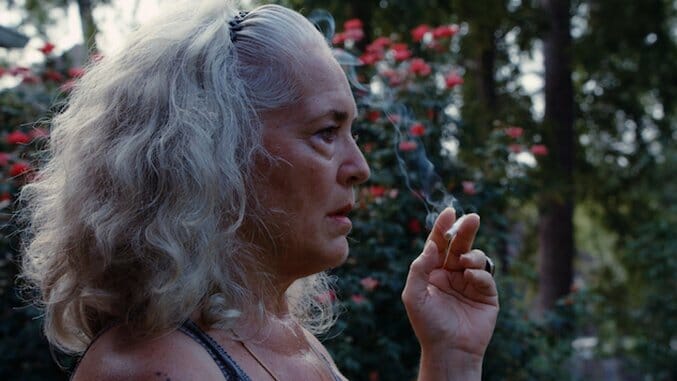
You’ve seen the plot of Krisha before: self-destructive woman with a drinking problem goes to a family gathering supposedly having made strides in putting her life back together, but finds the tensions that arise testing her resolve to not go back to the bottle. Jonathan Demme explored similar territory in his 2008 film Rachel Getting Married, and Trey Edward Shults’ debut film does have a similar looseness to it, a feeling that anything can happen at any time. That, however, is where the similarities end. Whereas Demme’s film was warmly observational, Shults’ film aims for an expressionism that imaginatively uses formal elements to invite us into the titular main character’s fractured psyche. You’ve seen the plot before, but not quite like this.
There are the changing aspect ratios, for one thing. The film’s first shot is a single close-up of Krisha (Krisha Fairchild), and it’s framed for a 1.33:1 aspect ratio. Afterwards, in the early stages of the Thanksgiving weekend that reunites Krisha with her family after a long absence, the film’s frame expands to a 1.85:1 ratio—until the pivotal moment when she relapses and tears into a wine bottle, at which point the film adopts an even wider 2.35:1 ratio before returning to the square-ish 1.33:1 frame in its final stretch. None of this is mere whimsy: In the context of what Krisha goes through, that 1.33:1 aspect ratio acts as the cold-shower corrective to the nervous tension she feels all through the 1.85:1 span, a pressure that can only be alleviated by the full width of 2.35:1 when she starts drinking again. Not even Wes Anderson was this attuned to the expressive possibilities when he pulled a similar maneuver in The Grand Budapest Hotel.
Music also plays a crucial role in the film’s style. The unexpected horror movie-like cacophony of strings that accompanies the aforementioned first close-up already commands attention, and Brian McOmber’s score just gets stranger from there. To a montage of Krisha trying to cook a turkey for Thanksgiving dinner while interacting with members of her extended family, McOmber unleashes a barrage of non-melodic electronic noise, some of it sounding like the aural equivalent of a pinball smacked around in a machine. But then, when Krisha pops open that fateful wine bottle, McOmber’s music becomes exultant, surely expressing Krisha’s own relieved mindset in the moment.
Shults’ overtly expressive molding of formal elements might have come off as merely show-offy had he not had the performances to back it up, especially in the lead role. But Krisha Fairchild’s performance is searing in its emotional range and transparency, the actress—a veteran TV and film performer who has never had a showcase like this before now—fearless in her willingness to let every vulnerable, frayed nerve ending show in her portrait of an addict struggling to keep it together in front of her family. Hers is not the only impressive piece of acting. Shults himself plays Trey, the son who Krisha left behind—one infers, because Shults never makes this explicit—and he brings to his performance a sense of simmering frustration at the woman who has disappointed him the most. Shults and Fairchild’s one scene alone together—in which she attempts to reconnect with her son, who is having none of it—vibrates with buried tension, all of it captured by cinematographer Drew Daniels in one ruthless long take.
The fact that many of the actors’ names correspond with the names of the characters they play—not just Trey and Krisha, but, among others, Krisha’s sister Robyn (Robyn Fairchild); Robyn’s daughters Vicky (Victoria Fairchild), Atheena (Atheena Frizell) and Augustine (Augustine Frizell); and Krisha and Robyn’s mother Billie (Billie Fairchild)—is not insignificant. Krisha Fairchild is, in fact, Shults’ aunt, and Robyn Fairchild his mother; and Shults reportedly based much of what happens in the film on his personal experiences. With such extra-textual facts taken into consideration, Krisha could be seen as cinematic family therapy: Shults’ way of dealing with what was apparently a troubled home life. But you don’t need to know all that to appreciate the passion he brought to this project. One can sense it in the film’s long takes and still setups, in the alternation between montages of unnerving chaos and lengthy scenes of shattering solitude. Krisha does more than announce a potentially major new talent; it shakes new, and tragically devastating, energy into the dysfunctional family drama.
Director: Trey Edward Shults
Writer: Trey Edward Shults
Starring: Krisha Fairchild, Robyn Fairchild, Chris Doubek, Billie Fairchild, Olivia Grace Applegate, Bryan Casserly
Release Date: March 18, 2016
Kenji Fujishima is a freelance film critic, contributing to Slant Magazine, Brooklyn Magazine, The Playlist, and the Village Voice in addition to Paste. He is also Deputy Editor of Movie Mezzanine and former editor-in-chief of In Review Online. When he’s not watching movies and writing and editing film criticism, he’s trying to absorb as much music, art and literature as possible. He has not infrequently been called a “culture vulture” for that reason.